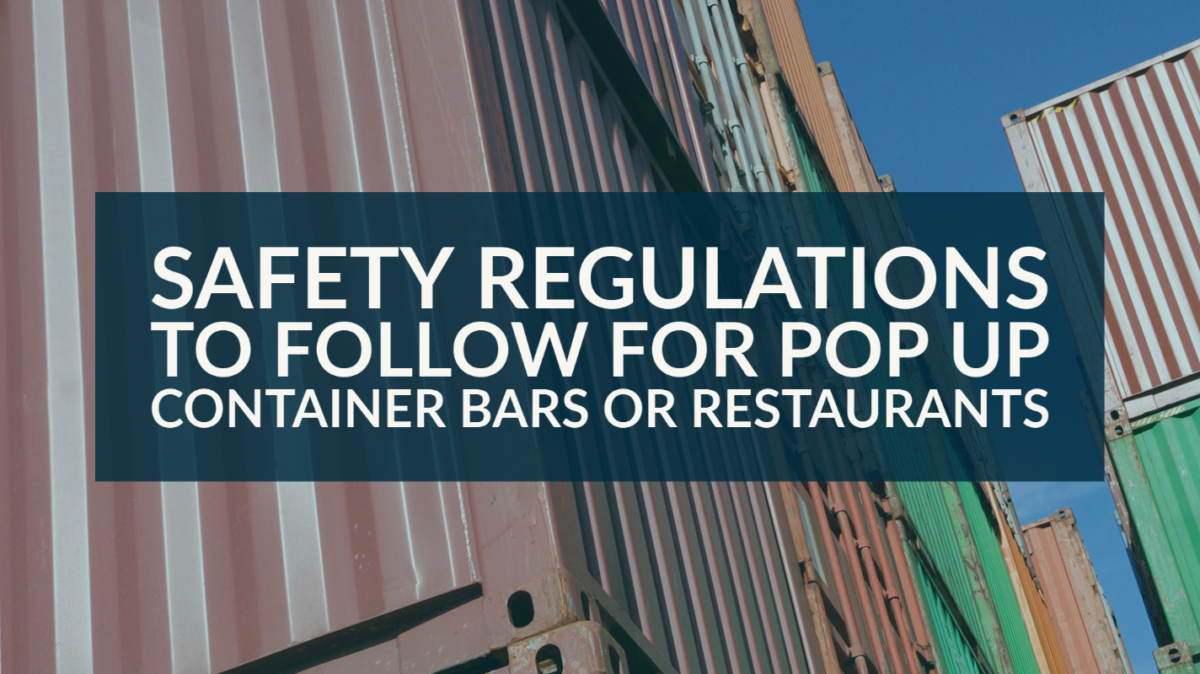Shipping container restaurants are all the rage. Starbucks is believed to have pioneered the concept in 2011 when it opened a 450 square foot shipping container store in Washington. Since then, the trend has gained momentum. The good news is that the eateries’ menus aren’t limited by their non-conventional locations. But even with the incredible convenience a pop up container bar offers, it’s important for restaurant owners to adhere to safety regulations. Here are essential safety regulations the owners should adhere to.
Safety Hazards in a Shipping Container Restaurant
As highlighted earlier, pop up container bars have limited spaces leading to cross-contamination. Bacteria like campylobacter spread easily through improper handling of dairy products, poultry, and meat. Another bacteria likely to cause food poisoning is E.coli and listeria which lodge in foods like mixed salad leaves. As such, pop up container restaurants should ensure proper food hygiene procedures are followed, e.g., washing fresh produce and keeping raw food away from cooked food. Similarly, perishable foods should be stored at the appropriate temperature to prevent the development of harmful bacteria.
How to Enhance Safety in a Pop Up Container Bar
While setting up a temporary food eatery is more appealing to customers, poor hygiene practices are easy to notice causing irreversible reputational damage. It’s important to ensure that the spaces comply with food hygiene regulations.
Secure a Good Food Hygiene Rating
One of the first considerations when setting up a pop up container bar and restaurant is to secure a food hygiene rating from the Foods Standards Agency. This means you should acquaint yourself with all food and safety standards like the safest temperature to cook food.
Conduct a Safety Risk Assessment
The assessment helps identify areas that need improvement. For example, you need to make sure the floor surfaces don’t have obstructions, have clear fire exits among other safety requirements. The risk assessment should analyze the safety of the location too. If the pop up container bar is set up in a field, evaluate any safety concerns this location poses. The ground may be uneven, prone to animal droppings, or insects. Similarly, if setting up the restaurant in a garden, old warehouse, or near your home, consider the safety elements you need to protect the structure against.
Outline the Hygiene Practices
The overall hygiene of your kitchen is crucial even in a shipping container cafe. Determine how you’ll prep the food, how to cool it, and store utensils. Do you need to set up a separate sink to wash veggies and wash hands? Are there special kitchen regulations for pop up restaurants? Also, if hiring cooking equipment, inspect it to ensure it passes recent safety checks.
You should also outline the entry and exit paths for customers. Setting up a good flow for people to order and eat reduces congestion and safety hazards. For example, you can place cutlery, serviettes, and condiments around the corner so the serving area has fewer people. Again, educating your staff about the benefits of maintaining proper food hygiene goes a long way in keeping the food and space clean. You may schedule regular training workshops to inform them about new hygiene practices while recapping the basics.
Learn How to Maintain the Appropriate Temperature for Your Foods
Many restaurant owners cite maintaining the right food temperature especially during the hot summer season challenging due to the non-conventional settings. The open nature of shipping containers makes pop up containers more prone to contaminants carried by the breeze.
They should also outline their food safety procedures based on the hazard analysis critical control point. Also, ensuring frozen foods are kept outside the fridge for a short time and avoiding overfilling the fridge helps maintain a healthy food temperature.
Maintaining proper food safety practices is crucial in the food industry. Introducing policies and procedures early on goes a long way in keeping a restaurant in a custom shipping container safe for customers and employees.

